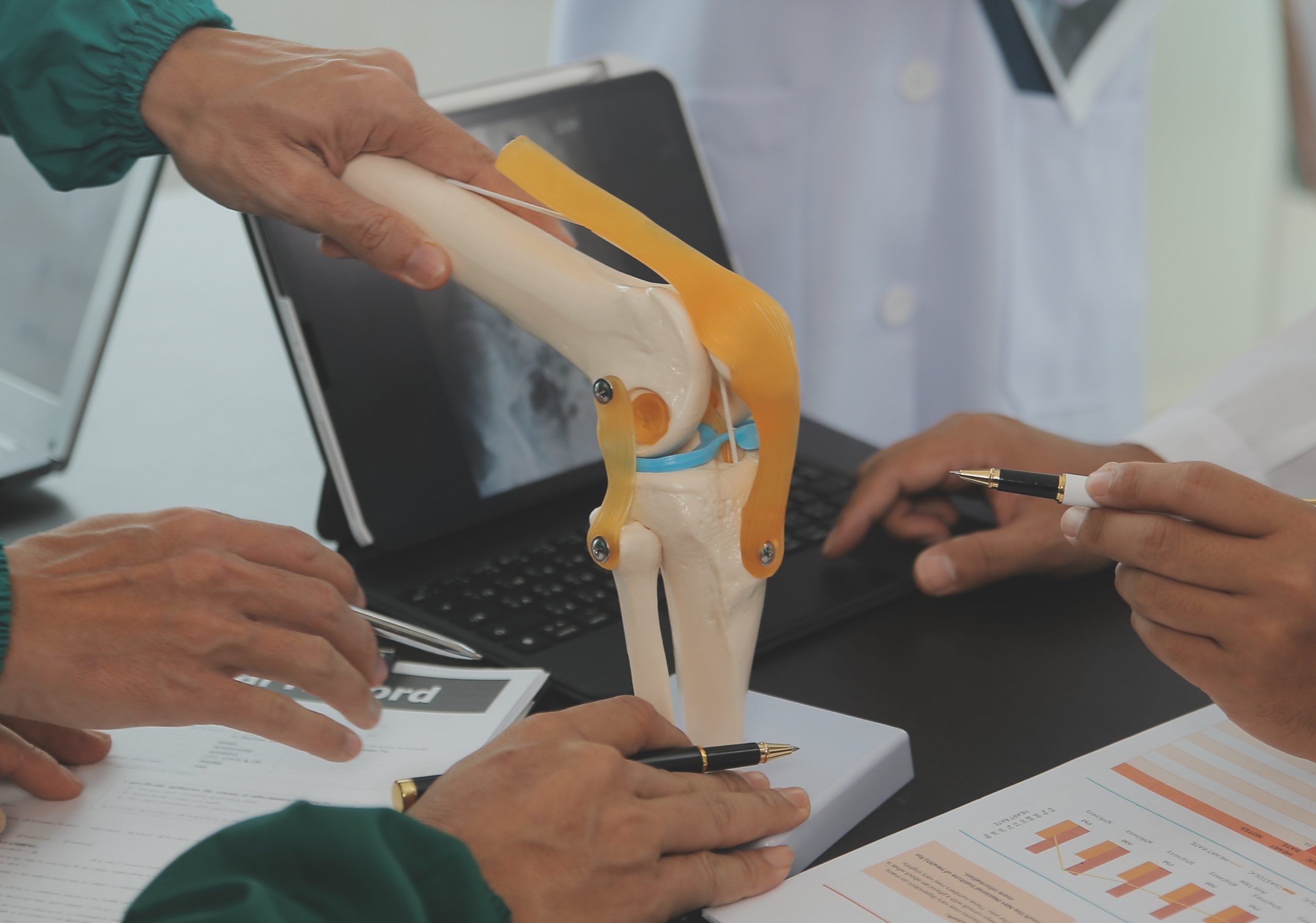-
Anesthesiology
-
Cardiology
-
Dietetics and Nutrition
-
Emergency Clinic
-
Foot and Ankle Clinic
-
General and Laparoscopic Surgery
-
Gynecology and Obstetrics
-
Hand Surgery
-
Hematology
-
Hip Surgery
-
Internal Medicine
-
Joint Replacement
-
Knee Surgery
-
Laboratory
-
Neurology
-
Neurosurgery
-
Oncology
-
Orthopedics and Sports Medicine
-
Pain Management
-
Pediatric Orthopedics
-
Physiotherapy
-
Plastic, Aesthetic and Reconstructive Surgery
-
Scoliosis Surgery
-
Shoulder Surgery
-
Spine Surgery
-
Sports Orthopedics
-
Urology
-
Vascular and Endovascular Surgery
Joint Replacement (Arthroplasty)
Joint replacement, or arthroplasty, is a surgical procedure designed to replace all or part of a joint with a prosthetic implant. This surgery is typically recommended when a joint has become damaged due to injury, arthritis, or other conditions, leading to severe pain, stiffness, and limited mobility. The goal of joint replacement surgery is to relieve pain, restore function, and improve the quality of life. At Burjeel Dubai, we specialize in providing advanced joint replacement surgeries with a focus on patient care and recovery.
Types of Arthroplasties
Common Joint Replacements
- Hip Replacement
Hip replacement surgery involves replacing the hip joint with a prosthetic implant. This procedure is commonly recommended for patients with severe osteoarthritis, rheumatoid arthritis, or hip fractures. The prosthetic hip can restore mobility and significantly reduce pain, allowing patients to return to their normal activities.
- Knee Replacement
Knee replacement surgery is performed to replace a damaged knee joint with an artificial one. This procedure is often necessary for individuals with advanced arthritis or significant knee injuries. A knee replacement can help patients regain the ability to walk and perform daily activities without pain, dramatically improving their quality of life.
- Shoulder Replacement
Shoulder replacement surgery involves replacing the shoulder joint with a prosthetic implant. This procedure is recommended for patients with severe osteoarthritis, rotator cuff tear arthropathy, avascular necrosis, or rheumatoid arthritis. The prosthetic shoulder can relieve pain and increase mobility, allowing patients to return to their normal activities.
- Ankle Replacement
Total ankle replacement, also known as ankle arthroplasty, is a surgical procedure aimed at treating ankle arthritis. This surgery can effectively alleviate ankle pain, enhance joint stability, and improve overall mobility. It’s typically recommended when other treatments fail to alleviate the symptoms of ankle arthritis.
- Elbow Replacement
If you find yourself constantly battling elbow pain and stiffness due to arthritis or other underlying conditions, elbow replacement surgery stands as a viable solution. This surgical procedure offers a pathway to alleviating chronic discomfort and reinstating mobility to a compromised elbow joint.
- Wrist Replacement
For individuals grappling with persistent wrist discomfort and limited mobility due to arthritis or injury, wrist replacement surgery emerges as a viable solution. This transformative procedure offers relief from chronic pain and restores functionality to a compromised wrist joint.
In addition to wrist, elbow, and ankle replacement surgeries, there are also procedures available for finger and toe replacement. These surgeries involve the removal of damaged or dysfunctional joints and their replacement with artificial joints, similar to those used in other joint replacement procedures. Finger replacement surgery can offer relief from conditions such as arthritis or severe injury, restoring mobility and function to the hand. Similarly, the replacement surgery addresses issues such as arthritis or deformities, enabling individuals to walk with greater ease and comfort. While less common than other joint replacements, these procedures provide viable options for individuals experiencing pain and limitations in their fingers or toes, offering the opportunity for improved quality of life and enhanced functionality.
Your surgeon will suggest either a total or a partial joint replacement:
- Total Joint Replacement
In a total joint replacement, the surgeon removes all the damaged or worn-out parts of a joint and replaces them with a prosthetic joint made of metal, plastic, or ceramic. This type of surgery is common for large joints such as the hip and knee.
- Partial Joint Replacement
Partial joint replacement, also known as joint resurfacing, involves replacing only the damaged parts of a joint while leaving the healthy parts intact. This approach is often used when the damage is limited to a specific area of the joint.
Procedure Details
- Preparation
Before undergoing joint replacement surgery at Burjeel Dubai, patients will undergo a series of evaluations and tests to ensure they are healthy enough for the procedure. This may include blood tests, imaging studies like X-rays or MRIs, and a thorough physical examination. Patients may also need to stop taking certain medications and follow specific instructions regarding eating and drinking before surgery to ensure the best possible outcome.
- The Surgery
On the day of the surgery, patients will receive anesthesia to ensure they do not feel any pain during the procedure. The type of anesthesia used may vary, including general anesthesia (putting the patient to sleep) or regional anesthesia (numbing the area around the joint).
During the surgery, the surgeon will:
- Remove the damaged cartilage and bone from the joint.
- Insert the prosthetic joint components.
- Fit the prosthetic parts securely into place.
- Reshape the surrounding bones if necessary to ensure a proper fit.
Some surgeries may involve robotic-assisted techniques, which allow for more precise placement of the prosthetic components, enhancing the overall success of the surgery.
- Post-Surgery
After the surgery, patients are moved to a recovery room where they are monitored as they wake up from anesthesia. Depending on the type of joint replaced and the patient’s overall health, some may go home the same day, while others may stay in the hospital for a few days to ensure a smooth recovery process.
Risks and Benefits
Benefits
Joint replacement surgery can offer significant benefits, including:
- Relief from chronic joint pain.
- Improved mobility and function.
- Enhanced quality of life and the ability to return to daily activities.
Risks
As with any major surgery, joint replacement comes with risks, including:
- Infection at the surgery site.
- Blood clots.
- Nerve or blood vessel damage.
- Complications with the prosthetic joint, such as loosening or wearing out over time.
Patients should discuss these risks with their surgeon and understand how to mitigate them to ensure the best possible outcome.
Recovery and Outlook
Recovery Time
Recovery from joint replacement surgery varies depending on the joint replaced and the individual patient. Generally, it takes several months to fully recover. Factors influencing recovery time include the patient’s age, overall health, the type of surgery, and the specific joint replaced.
Post-Operative Care
Key aspects of post-operative care include:
- Pain Management: Managing pain is crucial in the early stages of recovery. This may involve prescription pain medications, NSAIDs, and acetaminophen.
- Physical Therapy: Physical therapy is essential to regain strength and mobility. Patients will work with physical therapists to perform exercises designed to improve joint function and prevent stiffness.
- Home Care: Patients may need to adjust at home to ensure a safe and comfortable recovery environment. This can include using assistive devices and rearranging living spaces to avoid the need for climbing stairs.
Long-Term Outlook
Most patients experience a significant improvement in their quality of life after joint replacement surgery. The new joint can last for many years, with some lasting a lifetime. However, it is important to follow the surgeon’s instructions and attend regular follow-up appointments to ensure the joint remains in good condition and functions properly.
When to Call the Doctor
Patients should contact their healthcare provider immediately if they experience any of the following after joint replacement surgery:
- Severe pain that does not improve with medication.
- Signs of infection, such as fever, redness, swelling, or discharge from the incision site.
- Shortness of breath or chest pain.
- Unusual or worsening pain in the calf, ankle, or foot.
Early detection and treatment of complications are crucial for a successful recovery and to prevent any long-term issues.
Joint replacement surgery, or arthroplasty, at Burjeel Dubai, is a highly effective procedure for individuals suffering from severe joint pain and dysfunction. Whether it’s a hip replacement or knee replacement, the goal is to relieve pain, restore function, and improve the overall quality of life. By understanding the procedure, preparing adequately, and following post-operative care instructions, patients can achieve excellent outcomes and enjoy a significant improvement in their daily lives.
If you are considering joint replacement surgery, consult with your healthcare provider at Burjeel Dubai to determine the best course of action for your specific condition and to embark on the path to a pain-free life.
Total Hip Replacement
Partial Hip Replacement
Hip Resurfacing
Unicompartmental Knee Replacement
Shoulder Joint Replacement
Partial Shoulder Replacement
Shoulder Resurfacing
Reverse Total Shoulder Replacement
Stemmed Hemiarthroplasty
Resurfacing Hemiarthroplasty
Synovectomy
Arthroscopic Debridement
Elbow Interpositional Arthroplasty
Total Elbow Replacement
Wrist Joint Replacement
Arthritis of the Foot and Ankle
Total Knee Replacement
Unicompartmental Knee Replacement
Revision Knee Replacement
Minimally Invasive Knee Joint Replacement
Book Appointment with our Experts
Blogs

ACL Tear Recovery Timeline: Surgery vs. Non-Surgical Treatment
Read more
Vitamin D Deficiency Treatment: Comprehensive Guide to Boosting Your Levels Naturally
Read more
Understanding Vitamin D Deficiency: Causes, Symptoms, and Solutions
Read more










